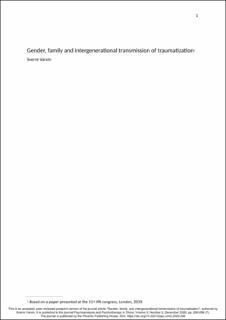Gender, family, and intergenerational transmission of traumatisation
Journal article, Peer reviewed
Accepted version
Permanent lenke
https://hdl.handle.net/10642/9923Utgivelsesdato
2020-12-01Metadata
Vis full innførselSamlinger
Originalversjon
Varvin. Gender, family, and intergenerational transmission of traumatisation. Psychoanalysis and Psychotherapy in China. 2020 https://doi.org/10.33212/ppc.v3n2.2020.290Sammendrag
China is a fast-developing country and at the same time a country where traditions play an important role. The society is also marked by centuries of upheavals that have affected individuals and families. The recent growth has brought millions of people out of poverty and increased possibilities for young people and families, but this development has also brought new tensions and conflicts affecting individuals and families. Ingrained in Chinese society and culture is a system which specifies implicit rules and patterns of rules, obligations, and responsibilities on social relations between men and women and between generations. Generally, family interests are more important than that of the individuals, and when the two are in conflict with each other, the family interests win. This article focuses on how the complex sociocultural situation affects individuals and families and how this manifest itself in the clinical situation. The aim is to highlight some aspects of the reality met in clinical encounters in China and to argue for an openness about how context always plays a role both in clinical and theoretical work.
